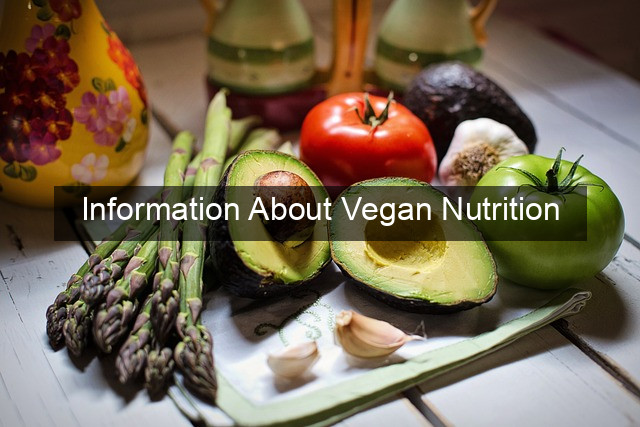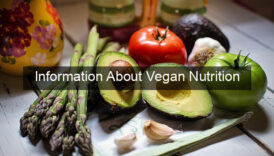Information About Vegan Nutrition

- Information About Vegan Nutrition
- Vegan Nutrition: A Comprehensive Guide
- Essential Nutrients for Vegans
- Protein Powerhouses
- Calcium for Strong Bones
- Iron: Fueling Your Body
- Planning a Balanced Vegan Diet
- Meal Prepping for Success
- Reading Food Labels Carefully
- Addressing Common Concerns
- Vitamin B12 Supplementation
- Conclusion
- FAQ
- What are the main benefits of a vegan diet?
- Is a vegan diet suitable for all ages?
- How can I ensure I'm getting enough protein on a vegan diet?

Vegan Nutrition: A Comprehensive Guide
More and more people are embracing veganism, a lifestyle choice that excludes all forms of animal exploitation and cruelty, whether for food, clothing, or any other purpose. This surge in popularity is driven by various factors, including ethical concerns for animals, environmental awareness, and the perceived health benefits of a plant-based diet. However, transitioning to and maintaining a healthy vegan lifestyle requires careful planning and a thorough understanding of vegan nutrition. It’s crucial to ensure you’re meeting all your nutritional needs without relying on animal products. This comprehensive guide delves into the essentials of vegan nutrition, providing valuable insights and practical tips for navigating a plant-based world.
Essential Nutrients for Vegans
Protein Powerhouses
Protein, crucial for building and repairing tissues, is often a concern for those considering veganism. Fortunately, numerous plant-based sources offer ample protein. Legumes like lentils, chickpeas, and beans are excellent choices, as are tofu, tempeh, and edamame, derived from soybeans. Nuts, seeds, and whole grains also contribute to your daily protein intake. Combining different plant-based protein sources throughout the day ensures you receive all the essential amino acids your body needs.
It’s important to debunk the myth that plant-based proteins are inferior to animal-based ones. While individual plant sources might lack certain amino acids, a varied diet easily overcomes this. Focusing on whole foods and incorporating a diverse range of protein-rich plants guarantees adequate protein intake for optimal health and well-being.
Tracking your protein intake, especially during the transition to veganism, can be beneficial. Several apps and online resources can help you monitor your macronutrients and ensure you’re meeting your protein requirements.
Calcium for Strong Bones
Calcium, essential for strong bones and teeth, is readily available in various plant-based foods. Leafy green vegetables like kale, collard greens, and bok choy are good sources. Fortified plant milks, such as almond, soy, or oat milk, often contain added calcium and vitamin D. Other sources include tofu (especially calcium-set tofu), fortified orange juice, and certain types of seaweed.
Ensuring adequate calcium intake is particularly important for growing children, pregnant women, and older adults. Consulting a registered dietitian or nutritionist can help you determine your specific calcium needs and develop a meal plan that meets those requirements.
Paying attention to factors that can inhibit calcium absorption is also crucial. For example, high intakes of oxalates, found in foods like spinach and rhubarb, can reduce calcium absorption. Consuming calcium-rich foods separately from oxalate-rich foods can maximize absorption.
Iron: Fueling Your Body
Iron plays a vital role in transporting oxygen throughout the body. While heme iron, found in animal products, is more readily absorbed, non-heme iron from plant sources can still contribute significantly to your daily needs. Legumes, lentils, tofu, spinach, and fortified cereals are good sources of non-heme iron.
Boosting iron absorption from plant-based foods is achievable through strategic food pairings. Consuming iron-rich foods alongside vitamin C-rich foods, such as citrus fruits or bell peppers, enhances iron absorption. Avoiding coffee or tea with meals containing iron can also improve absorption.
If you suspect an iron deficiency, consult a healthcare professional. They can perform blood tests to assess your iron levels and recommend appropriate interventions if necessary.
Planning a Balanced Vegan Diet
Meal Prepping for Success
Planning your meals in advance is key to maintaining a healthy and balanced vegan diet. Meal prepping can save you time and ensure you have nutritious options readily available, reducing the temptation to rely on less healthy convenience foods.
Creating a weekly meal plan and preparing some components in advance can simplify your week. Consider batch cooking grains, legumes, or roasted vegetables, which can be used in various meals throughout the week.
Numerous online resources and cookbooks offer vegan meal prepping ideas and recipes. Experiment with different recipes and find what works best for your lifestyle and preferences.
Reading Food Labels Carefully
Becoming a savvy label reader is crucial for vegans. Carefully examining food labels helps you identify hidden animal products and ensure you’re making informed choices about the foods you consume.
Pay close attention to ingredients lists and look for potential allergens or ingredients you wish to avoid. Be aware of less obvious animal-derived ingredients, such as gelatin or certain food colorings.
Understanding nutrition labels also helps you track your intake of essential nutrients. Pay attention to serving sizes and the percentage of daily values for key nutrients like protein, iron, and calcium.
Addressing Common Concerns
Vitamin B12 Supplementation
Vitamin B12, crucial for nerve function and red blood cell production, is primarily found in animal products. Vegans need to supplement with vitamin B12 or consume fortified foods to meet their requirements.
Various forms of vitamin B12 supplements are available, including tablets, sublingual drops, and injections. Consult a healthcare professional to determine the appropriate dosage and form for your individual needs.
Regularly monitoring your B12 levels through blood tests is essential for vegans. This ensures the supplement or fortified foods are effectively maintaining adequate B12 levels.
Conclusion
Embracing a vegan lifestyle offers numerous benefits, both for individual health and the planet. However, careful planning and a deep understanding of vegan nutrition are essential for thriving on a plant-based diet. By focusing on consuming a variety of nutrient-rich whole foods, vegans can easily meet their nutritional needs and enjoy a healthy and fulfilling life. From protein powerhouses like legumes and tofu to calcium-rich leafy greens and iron-packed lentils, the plant kingdom offers a wealth of options for building a balanced and nutritious vegan diet. Remember to supplement with vitamin B12 and pay attention to food labels to ensure you’re getting all the essential nutrients your body requires. With proper planning and mindful choices, a vegan lifestyle can be both healthy and enjoyable.
While transitioning to veganism might seem daunting at first, ample resources are available to support your journey. Numerous online communities, cookbooks, and registered dietitians specializing in plant-based nutrition can provide guidance and support. Embrace the learning process, experiment with new recipes, and enjoy the abundance of delicious and nutritious plant-based foods available.
FAQ
What are the main benefits of a vegan diet?
A vegan diet can offer several health benefits, including lower risks of heart disease, type 2 diabetes, and certain cancers. It can also contribute to weight management and improved digestion.
Is a vegan diet suitable for all ages?
With careful planning, a vegan diet can be suitable for all ages, including children, pregnant women, and older adults. It’s essential to pay close attention to nutrient intake and consider supplementation where necessary.
How can I ensure I’m getting enough protein on a vegan diet?
Include a variety of plant-based protein sources in your diet, such as legumes, tofu, tempeh, nuts, seeds, and whole grains. Combining different sources throughout the day ensures you get all the essential amino acids.
| Nutrient | Vegan Sources |
|---|---|
| Protein | Lentils, tofu, tempeh, beans, nuts, seeds |
| Calcium | Leafy greens, fortified plant milks, tofu |
| Iron | Legumes, lentils, tofu, spinach, fortified cereals |
- Plan your meals in advance.
- Read food labels carefully.
- Consult a registered dietitian or nutritionist for personalized guidance.




